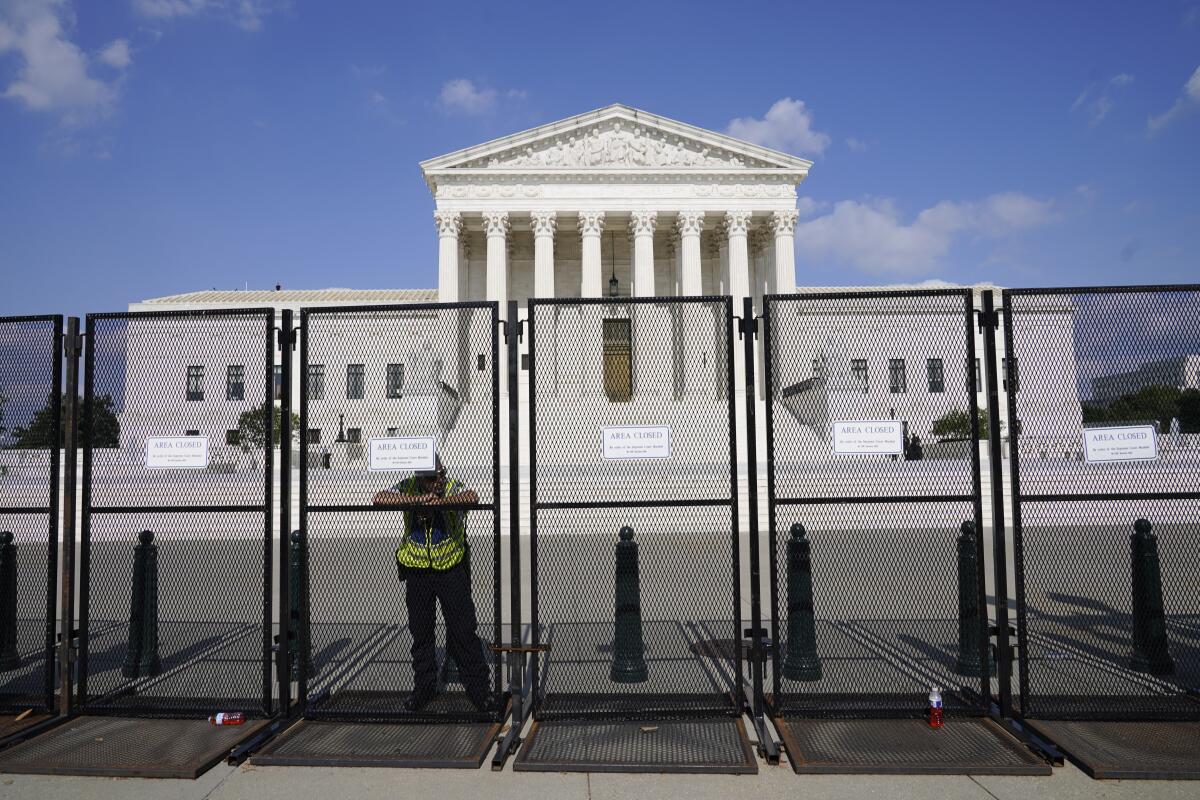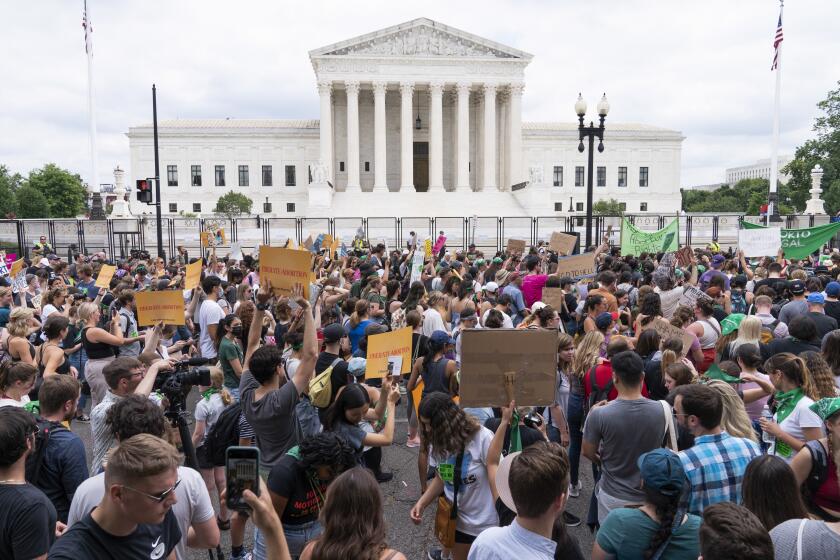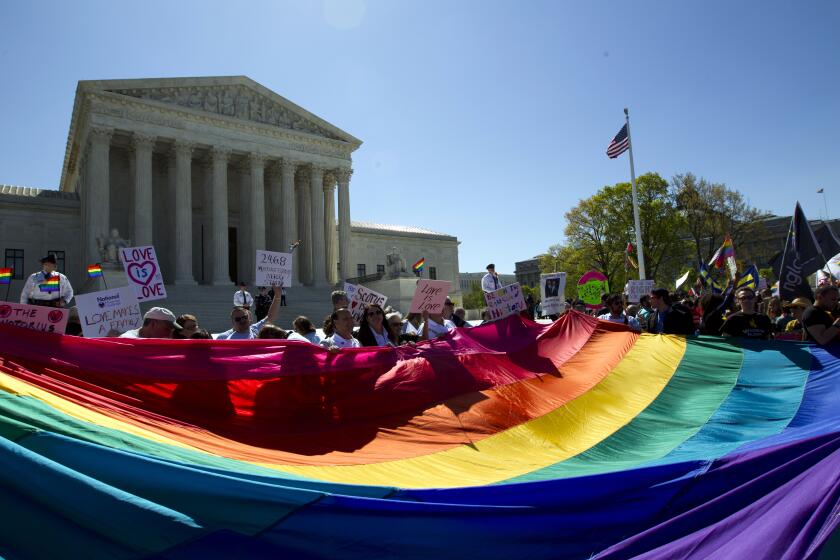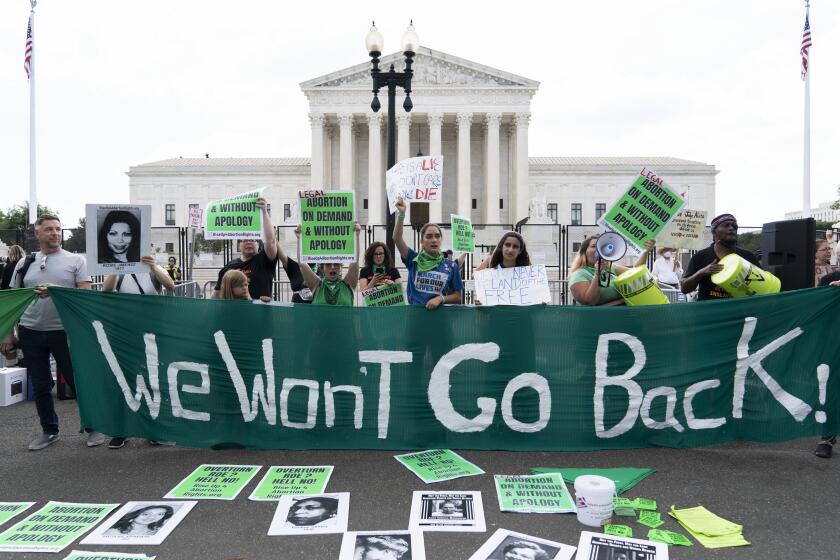Op-Ed: The end of Roe will lead to baseless attacks on gay rights

- Share via
Within hours of the Supreme Court decision to overturn Roe vs. Wade, abortion was banned in 13 states when so-called trigger laws went into effect. The grim impact of criminalizing women’s choices about their bodies will be stark and immediate, but predictable.
As a queer woman, I have struggled to conceptualize the full reach of this decision beyond abortion. In the days and weeks after the leaked draft opinion in Dobbs vs. Jackson Women’s Health Organization, the previously unimaginable recriminalization of gay sex and the loss of my right to marry felt chillingly possible. The world continued to spin, but I fought against a paralytic fear of the unknown.
I grew up in Oklahoma and came out just three years after Lawrence vs. Texas. Lawrence meant that queer relationships could no longer be criminalized. But coming out has rarely come without cost. Some of us lost jobs, families, military commissions. Rejection — or the threat of it — cost most of us a piece of our self-worth and inner shine at a time when we needed it the most. As Justice Anthony Kennedy later articulated in Obergefell vs. Hodges, Lawrence moved queer people from outlaws to outcasts. It was better, but still proved to be a compromised way to move through the world.
Roe vs. Wade was overruled not because of anything about its reasoning, but because Donald Trump was able to appoint three justices to the court who would end abortion rights.
I never imagined that I would have the right to marry. Then United States vs. Windsor and Obergefell provided my family and countless others with the security of legal and social recognition. Mundane activities are still points of pride — filing taxes, getting health insurance, buying a house together.
My wife and I brought our children into this post-marriage-equality world thousands of miles from my hometown. We have had the privilege to live boldly and unapologetically gay lives. After reading the leaked opinion in Dobbs, suddenly the dreams we had for ourselves and our children felt shaken. But then we went to Pride. Watching my kids carelessly dance in the Portland summer rain, I felt something else. As a mother I may be afraid. As a civil rights lawyer and professor, I am just indignant.
My constitutional right to have sex and to marry the person I love exists independently of my constitutional right to have a safe, legal abortion.
Follow me here.
In Roe, the Supreme Court recognized a fundamental right to abortion as an outgrowth of a broader right to privacy, or as Justice Louis Brandeis famously wrote in 1928: the right “to be let alone.”
After the fall of Roe vs. Wade, abortion and other culture war issues are likely to be hashed out state by state. The equality movement is outgunned by the radical right.
Through this lens, Roe held that the Bill of Rights protected the essence of privacy, which created a liberty interest under the 14th Amendment’s due process clause. Yet the court has consistently moved away from privacy as a means to recognizing fundamental rights. Lawrence vs. Texas reflected this trend — rejecting the privacy-based framework. Instead, Kennedy recognized the interlocking rights of both liberty and equality as the basis for the constitutional right to have gay sex without being branded a criminal. Kennedy beautifully concluded that “freedom extends beyond spatial bounds. Liberty presumes an autonomy of self that includes freedom of thought, belief, expression, and certain intimate conduct.”
Lawrence affirmed what queer people have always known: Sex is inherently private, but it is only one dimension of a queer life. Queer equality and liberty demand far more than the hushed tones and dark bedrooms of privacy.
True equality demands the opposite of being “let alone.” Liberty and equality offer the promise to be “let in” — the right to participate and to be seen. The self-definition articulated in Lawrence and recognized by Obergefell is simply unattainable in a vacuum defined only by privacy. We define our queerness against the relief of broader society, which requires exposure, comparison, understanding. As Martha Shelley shouted in the earliest days of gay liberation, “when I am among gays or in bed with another woman, I am a person, not a lesbian. When I am observable to the straight world, I become gay. You are my litmus paper.”
The denial of constitutional protections for abortion access will engender profound, far-reaching damage on individuals, families and communities. The fallout from this decision cannot be overstated.
The maternal mortality rate for Black women is already three times as high as for white women. Expect that disparity to grow.
Already, we see that Justice Clarence Thomas’ concurring opinion is an unabashed invitation to anti-LGBTQ advocates to bring new challenges to other fundamental rights, including attacks on the decriminalization of gay relationships and same-sex marriage. Thomas also advocates reconsidering the 1965 Supreme Court ruling that the Constitution protects the right of married couples to use contraception.
All of these efforts would be nothing but disingenuous, political maneuvers masquerading as law. The interlocking liberty and equality foundation of Lawrence and Obergefell should survive the political activism that shaped the Dobbs decision. The willingness of the court to revisit these rights exposes a motivation of ideology, political gain and power — not constitutional fealty.
In the course of my millennial lifetime, my legal status has shifted from criminal to outcast to equal. Today’s political realities cannot be ignored, but I was equal long before Kennedy picked up the pen. I have inherent equal dignity and personhood that persists, embedded in my constitutional claim to liberty, regardless of the personal or ideological opinions of any judge.
Perhaps more critically, it is bolstered by the moral arc of the universe, which will bend our way. We cannot accept a diminished and distorted version of equality. Instead, we must stand and meet the gaze of this moment with what it demands: indignant pride.
Robin Maril is a professor teaching constitutional, administrative and health law at Willamette University College of Law.
More to Read
A cure for the common opinion
Get thought-provoking perspectives with our weekly newsletter.
You may occasionally receive promotional content from the Los Angeles Times.













